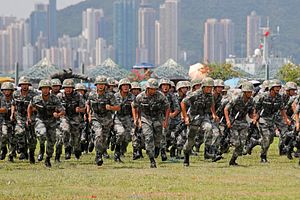China’s military deployed fresh troops to Hong Kong on Thursday in what it called a routine rotation amid speculation that it might intervene in the city’s pro-democracy protests.
Video broadcast on China Central Television showed a long convoy of armored personnel carriers and trucks crossing the border at night and troops in formation disembarking from a ship. Earlier, scores of soldiers ran in unison onto trucks, which the state broadcaster said were bound for ports and entry points into Hong Kong. A handover ceremony was held before dawn.
“This time the task has a glorious mission. The responsibility is great. The job is difficult,” an unnamed major said to troops before they departed. “The time for a true test has arrived!”
The official Xinhua News Agency said it was the 22nd rotation of the People’s Liberation Army’s garrison in Hong Kong. The previous one was in August 2018.
Nearly three months of fiery anti-government demonstrations have sparked concerns that the military will be deployed in the semi-autonomous Chinese city. The Hong Kong garrison earlier published a promotional video with scenes of soldiers facing off with people dressed like protesters.
Chinese Defense Ministry spokesman Ren Guoqiang told reporters in Beijing on Thursday that the demonstrators must abide by Hong Kong’s laws.
A leader of 2014 pro-democracy protests in Hong Kong said the city’s government is using the same tactics as five years ago.
“The government is just trying to threaten people with emergency law, with the entrance of the People’s Liberation Army,” Yvonne Leung said at a news conference.
A former British colony, Hong Kong was returned to China in 1997 under a “one country, two systems” framework, which promises the city certain democratic rights that are not afforded to the mainland. In recent years, however, some Hong Kong residents have accused Beijing of steadily eroding their freedoms.
The newly arrived Chinese troops have been educated on Hong Kong’s laws and vowed to defend the nation’s sovereignty, Xinhua said.
“We will firmly implement the guideline of ‘one country, two systems’ and the Basic Law and the Garrison Law of Hong Kong,” Liu Zhaohui, the garrison’s deputy chief of staff, said on CCTV.
The Garrison Law allows the Hong Kong-stationed troops to help maintain public order at the request of the city government. That has never happened, and Hong Kong authorities have said they can handle the situation themselves.
Troops stationed in Macao, another special administrative region, also completed a rotation Thursday.
The Xinhua report on the previous rotation in August 2018 did not mention “one country, two systems” or national sovereignty. Previous announcements on troop rotations had also specified that the overall number of troops and equipment had not changed, but that proclamation was absent this year.
Ren, the Chinese Defense Ministry spokesperson, was asked Thursday if there were more troops in Hong Kong after this rotation “compared with the previous ones.” Ren repeated that “this year’s rotation is a routine arrangement,” but did not confirm that troop numbers had remained the same.
“The garrison troops will conduct military training and perform their duties according to the annul plan and fulfill the obligation of defending Hong Kong according to law,” Ren said. “The PLA Hong Kong Garrison will resolutely follow the command of the [Chinese Communist Party] Central Committee and the Central Military Commission. It has the determination, confidence and capability to perform its obligations and missions entrusted by the Garrison Law and protect long-term prosperity and stability of Hong Kong.”
By Ken Moritsugu and Yanan Wang for The Associated Press. Associated Press videojournalist Johnson Lai contributed to this report. The Diplomat also contributed reporting.

































